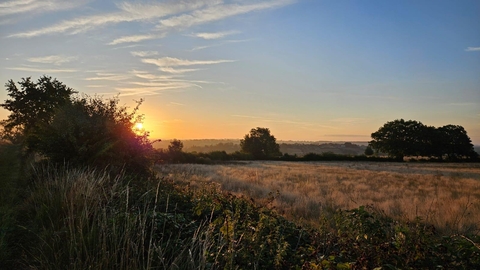
(c) Amy Bennett
Common Farm
Location
Know before you go
Dogs
Well-behaved dogs are welcome but should be kept on a lead when livestock are on site and during bird nesting season.
When to visit
Opening times
Open 24/7Best time to visit
Spring/SummerAbout the reserve
Common Farm: Where Community Meets Rewilding
Common Farm serves as both a rewilding site, making space for nature, and a living laboratory where people experience a transformation happening across Derbyshire's landscapes. Located in the heart of our Derwent Living Forest priority landscape, this site demonstrates how strategic habitat creation can deliver multiple benefits.
The rewilding work here will span new wetlands, species-rich grasslands and natural scrub and woodland regeneration, all in a dynamic mosaic. Visitors can walk across the site and see how each contributes to the broader landscape network. The wetlands will filter water and provide habitat for breeding birds, the grasslands support declining butterfly species and the developing woodlands create carbon storage whilst offering shelter for larger mammals.
What makes Common Farm special will be its community focus. The site hosts regular educational programmes where school groups learn about ecosystem recovery through hands-on experience. Volunteer days will bring together people of all ages to participate in practical rewilding work - from Being animals (Boars, Jays, Beavers) to habitat monitoring.
Seasonal events connect visitors with the natural calendar. Spring dawn chorus walks will reveal the growing bird community. Summer butterfly surveys will show how grassland management supports pollinators. Autumn fungi forays will explore the hidden networks that support woodland health. Winter track and sign sessions will demonstrate how wildlife uses the landscape when we're not watching.
For many participants, especially young families, Common Farm will provide experiences that previous generations took for granted - hearing skylarks over grassland, seeing wildflower meadows in full bloom or watching young wildlife learning to navigate their environment.
The site will also function as a training ground for our nature-led approach. Volunteer groups and partner organisations visit to see rewilding techniques in practice, learning approaches they can apply elsewhere. This knowledge sharing extends the impact far beyond the site boundaries.
Most importantly, Common Farm shows that rewilding isn't something that happens in distant places. It demonstrates how communities can be active participants in landscape recovery, creating the skills and enthusiasm needed for wider environmental restoration.
